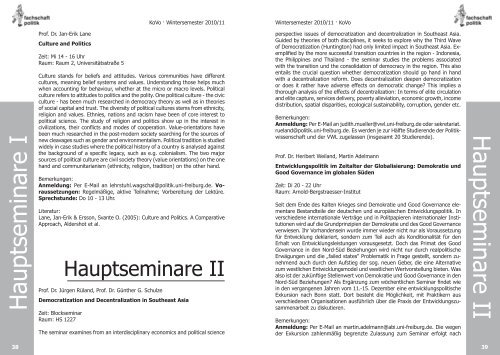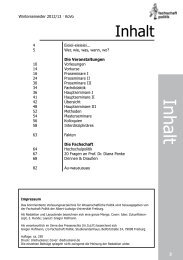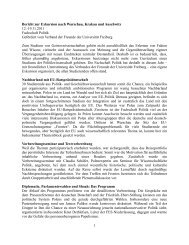BA Politikwissenschaft - FS Politik der Uni Freiburg
BA Politikwissenschaft - FS Politik der Uni Freiburg
BA Politikwissenschaft - FS Politik der Uni Freiburg
Sie wollen auch ein ePaper? Erhöhen Sie die Reichweite Ihrer Titel.
YUMPU macht aus Druck-PDFs automatisch weboptimierte ePaper, die Google liebt.
Hauptseminare I<br />
Prof. Dr. Jan-Erik Lane<br />
Culture and Politics<br />
Zeit: Mi 14 - 16 Uhr<br />
Raum: Raum 2, <strong>Uni</strong>versitätsstraße 5<br />
KoVo · Wintersemester 2010/11<br />
Culture stands for beliefs and attitudes. Various communities have different<br />
cultures, meaning belief systems and values. Un<strong>der</strong>standing those helps much<br />
when accounting for behaviour, whether at the micro or macro levels. Political<br />
culture refers to attitudes to politics and the polity. One political culture - the civic<br />
culture - has been much researched in democracy theory as well as in theories<br />
of social capital and trust. The diversity of political cultures stems from ethnicity,<br />
religion and values. Ethnies, nations and racism have been of core interest to<br />
political science. The study of religion and politics show up in the interest in<br />
civilizations, their conflicts and modes of cooperation. Value-orientations have<br />
been much researched in the post-mo<strong>der</strong>n society searching for the sources of<br />
new cleavages such as gen<strong>der</strong> and environmentalism. Political tradition is studied<br />
widely in case studies where the political history of a country is analysed against<br />
the background of a specific legacy, such as e.g. colonialism. The two major<br />
sources of political culture are civil society theory (value orientations) on the one<br />
hand and communitarianism (ethnicity, religion, tradition) on the other hand.<br />
Bemerkungen:<br />
Anmeldung: Per E-Mail an lehrstuhl.wagschal@politik.uni-freiburg.de. Voraussetzungen:<br />
Regelmäßige, aktive Teilnahme; Vorbereitung <strong>der</strong> Lektüre.<br />
Sprechstunde: Do 10 - 13 Uhr.<br />
Literatur:<br />
Lane, Jan-Erik & Ersson, Svante O. (2005): Culture and Politics. A Comparative<br />
Approach, Al<strong>der</strong>shot et al.<br />
Hauptseminare II<br />
Prof. Dr. Jürgen Rüland, Prof. Dr. Günther G. Schulze<br />
Democratization and Decentralization in Southeast Asia<br />
Zeit: Blockseminar<br />
Raum: HS 1227<br />
The seminar examines from an interdisciplinary economics and political science<br />
Wintersemester 2010/11 · KoVo<br />
perspective issues of democratization and decentralization in Southeast Asia.<br />
Guided by theories of both disciplines, it seeks to explore why the Third Wave<br />
of Democratization (Huntington) had only limited impact in Southeast Asia. Exemplified<br />
by the more successful transition countries in the region - Indonesia,<br />
the Philippines and Thailand - the seminar studies the problems associated<br />
with the transition und the consolidation of democracy in the region. This also<br />
entails the crucial question whether democratization should go hand in hand<br />
with a decentralization reform. Does decentralization deepen democratization<br />
or does it rather have adverse effects on democratic change? This implies a<br />
thorough analysis of the effects of decentralization: In terms of elite circulation<br />
and elite capture, services delivery, poverty alleviation, economic growth, income<br />
distribution, spatial disparities, ecological sustainability, corruption, gen<strong>der</strong> etc.<br />
Bemerkungen:<br />
Anmeldung: Per E-Mail an judith.mueller@vwl.uni-freiburg.de o<strong>der</strong> sekretariat.<br />
rueland@politik.uni-freiburg.de. Es werden je zur Hälfte Studierende <strong>der</strong> <strong><strong>Politik</strong>wissenschaft</strong><br />
und <strong>der</strong> VWL zugelassen (insgesamt 20 Studierende).<br />
Prof. Dr. Heribert Weiland, Martin Adelmann<br />
Entwicklungspolitik im Zeitalter <strong>der</strong> Globalisierung: Demokratie und<br />
Good Governance im globalen Süden<br />
Zeit: Di 20 - 22 Uhr<br />
Raum: Arnold-Bergstraesser-Institut<br />
Seit dem Ende des Kalten Krieges sind Demokratie und Good Governance elementare<br />
Bestandteile <strong>der</strong> deutschen und europäischen Entwicklungspolitik. In<br />
verschiedene internationale Verträge und in Politpapieren internationaler Institutionen<br />
wird auf die Grundprinzipien <strong>der</strong> Demokratie und des Good Governance<br />
verwiesen. Ihr Vorhandensein wurde immer wie<strong>der</strong> nicht nur als Voraussetzung<br />
für Entwicklung deklariert, son<strong>der</strong>n zum Teil auch als Konditionalität für den<br />
Erhalt von Entwicklungsleistungen vorausgesetzt. Doch das Primat des Good<br />
Governance in den Nord-Süd Beziehungen wird nicht nur durch realpolitische<br />
Erwägungen und die „failed states“ Problematik in Frage gestellt, son<strong>der</strong>n zunehmend<br />
auch durch den Aufstieg <strong>der</strong> sog. neuen Geber, die eine Alternative<br />
zum westlichen Entwicklungsmodel und westlichen Wertvorstellung bieten. Was<br />
also ist <strong>der</strong> zukünftige Stellenwert von Demokratie und Good Governance in den<br />
Nord-Süd Beziehungen? Als Ergänzung zum wöchentlichen Seminar findet wie<br />
in den vergangenen Jahren vom 11.-15. Dezember eine entwicklungspolitische<br />
Exkursion nach Bonn statt. Dort besteht die Möglichkeit, mit Praktikern aus<br />
verschiedenen Organisationen ausführlich über die Praxis <strong>der</strong> Entwicklungszusammenarbeit<br />
zu diskutieren.<br />
Bemerkungen:<br />
Anmeldung: Per E-Mail an martin.adelmann@abi.uni-freiburg.de. Die wegen<br />
<strong>der</strong> Exkursion zahlenmäßig begrenzte Zulassung zum Seminar erfolgt nach<br />
38 39<br />
Hauptseminare II




